措辞的用法diction
第四讲--正确选择词义

2.词义辨析
• 词义辨析是遣词用字的前提。一般来讲,词典给
出的词义解释五花八门,无从定夺。在这样的情 况下,可以从四个方面来处理英语词语的具体含 义: 1) 根据构词法辨别词义 可以根据词的前后缀,词根、词干来辨析词义; 如: miniultrasonicprober = mini (微型的)+ ultra(超) +sonic (声音的)+prober(探测 器);即:微型超声波探测仪 macrospacetransship = macro(巨型的)+ space (太空)+ trans (转运)+ ship (船); 即: 巨型空间转运飞船
再如story一词的翻译
(1) This war is becoming the most important story of this generation. (2) It is quite another story now. (3) Some reporters who were not included in the session broke the story. (4) He’ll be very happy if that story holds up. (5) The girl’s story is one of the saddest. (6) A young man came to Scotti’s office with a story. (7) …, but officials refused to confirm the story. (8) The story about him became smaller and by and by faded out from the American TV.
Unit 2 Diction
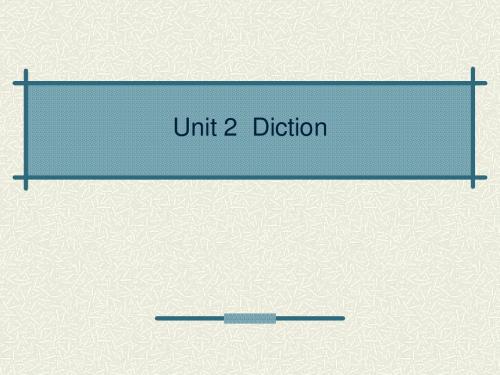
6
3. One word with Several Equivalents of Different Meanings This is also very common in translation. For example: ·cousin: 堂兄﹑堂弟﹑堂姐﹑堂妹﹑表哥 ﹑表弟﹑表姐﹑表妹…… ·president: 总统﹑总裁﹑主席﹑董事长﹑ 议长﹑会长﹑社长﹑校长…… ·carry: 搬﹑运﹑送﹑提﹑拎﹑挑﹑担﹑背 ﹑抬,搂﹑抱﹑举﹑夹……
Unit 2 Diction
I. Equivalence between English and Chinese at Word Level II. Methods of Discriminating the Original Meaning of a Given Word Ⅲ. Techniques of Translating a Given English Word Ⅳ. Diction in Chinese-English Translation
7
3. One word with Several Equivalents of Different Meanings
·走:
walk, saunter.闲逛, , amble 慢步行走, stride大步行走, trudge跋涉, shamble蹒跚 地走, prance昂首阔步, scamper奔跑, clump用沉重的脚步行走 , tiptoe用脚尖 走… ·机:machine, engine, plane, aircraft… ·羊:sheep 绵羊 , goat 山羊 , ram 公羊, ewe 母羊, lamb 羔羊…
1
By “diction” 措辞 we mean the proper choice of words and phrases in transltaion on the basis of accurate comprehension of the original. In the practice of translation, what perplexes(confuses) us most frequently is how to find an equivalent in the language to be translated into. Just as a noted linguist has observed, “the meaning of a word is its use in the language”, and “each word, when used in a new context, is a new word”.
Unit Two Diction

Part 2 Levels of Words
The words that we come across can be divided into 3 types, according to a stylistic point of view:
formal, common, and colloquial.
I feel that paying attention to words used around you is the best way to increase your working vocabulary. If you are really into improving the number of words you know, you can use such vocabulary-improvement lessons as are in the Reader's Digest.
3.1 Don't need long words Television commentator William S. Buckley has a tremendous vocabulary and would often overpower his debate opponents through the use of long words, whose definitions only highly literate people would know. He wouldn't win on logic of argument but on frustrating his opponents.
3.4 Summary
A good vocabulary does not mean you know many long or difficult words. Instead, it means that you know how to express yourself so that the reader will understand your material. Sometimes is it necessary to use industry-specific jargon, but you still must make sure everyone understands what you are writing. It is worthwhile to constantly work at improving your knowledge of words.
庄重与措辞_葛底斯堡演说_的译文点评(1)
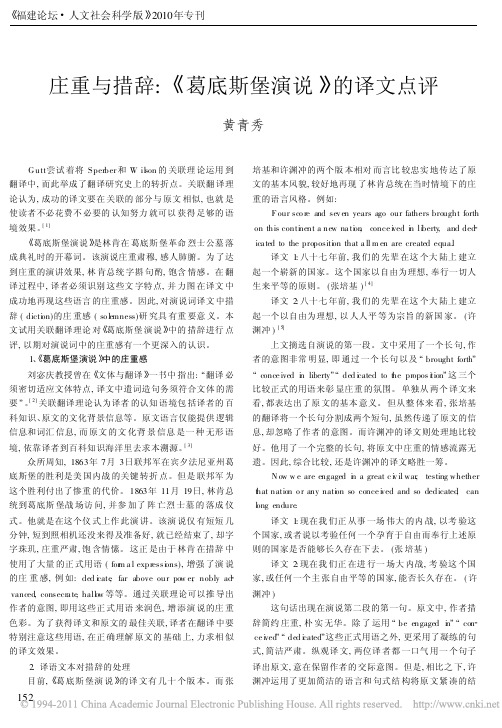
庄重与措辞: 葛底斯堡演说 的译文点评黄青秀G utt尝试着将Sperber和W il son的关联理论运用到翻译中,而此举成了翻译研究史上的转折点。
关联翻译理论认为,成功的译文要在关联的部分与原文相似,也就是使读者不必花费不必要的认知努力就可以获得足够的语境效果。
[1]葛底斯堡演说 是林肯在葛底斯堡革命烈士公墓落成典礼时的开幕词。
该演说庄重肃穆,感人肺腑。
为了达到庄重的演讲效果,林肯总统字斟句酌,饱含情感。
在翻译过程中,译者必须识别这些文字特点,并力图在译文中成功地再现这些语言的庄重感。
因此,对演说词译文中措辞(dicti on)的庄重感(so l emness)研究具有重要意义。
本文试用关联翻译理论对 葛底斯堡演说 中的措辞进行点评,以期对演说词中的庄重感有一个更深入的认识。
1、 葛底斯堡演说 中的庄重感刘宓庆教授曾在 文体与翻译 一书中指出: 翻译必须密切适应文体特点,译文中遣词造句务须符合文体的需要 。
[2]关联翻译理论认为译者的认知语境包括译者的百科知识、原文的文化背景信息等。
原文语言仅能提供逻辑信息和词汇信息,而原文的文化背景信息是一种无形语境,依靠译者到百科知识海洋里去求本溯源。
[3]众所周知,1863年7月3日联邦军在宾夕法尼亚州葛底斯堡的胜利是美国内战的关键转折点。
但是联邦军为这个胜利付出了惨重的代价。
1863年11月19日,林肯总统到葛底斯堡战场访问,并参加了阵亡烈士墓的落成仪式。
他就是在这个仪式上作此演讲。
该演说仅有短短几分钟,短到照相机还没来得及准备好,就已经结束了,却字字珠玑,庄重严肃,饱含情愫。
这正是由于林肯在措辞中使用了大量的正式用语(for m a l expressi ons),增强了演说的庄重感,例如:ded i cate,far above our pow er,nobly ad vanced,consecra te,hall ow等等。
通过关联理论可以推导出作者的意图,即用这些正式用语来润色,增添演说的庄重色彩。
Diction
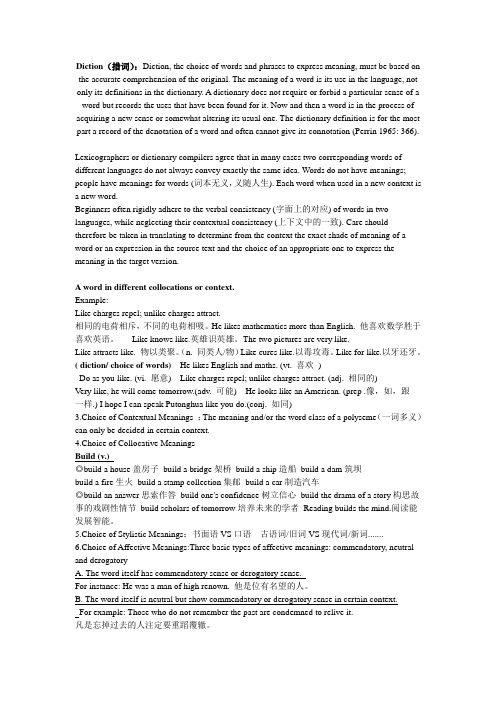
Diction(措词):Diction, the choice of words and phrases to express meaning, must be based on the accurate comprehension of the original. The meaning of a word is its use in the language, not only its definitions in the dictionary. A dictionary does not require or forbid a particular sense of a word but records the uses that have been found for it. Now and then a word is in the process of acquiring a new sense or somewhat altering its usual one. The dictionary definition is for the most part a record of the denotation of a word and often cannot give its connotation (Perrin 1965: 366).Lexicographers or dictionary compilers agree that in many cases two corresponding words of different languages do not always convey exactly the same idea. Words do not have meanings; people have meanings for words (词本无义,义随人生). Each word when used in a new context is a new word.Beginners often rigidly adhere to the verbal consistency (字面上的对应) of words in two languages, while neglecting their contextual consistency (上下文中的一致). Care should therefore be taken in translating to determine from the context the exact shade of meaning of a word or an expression in the source text and the choice of an appropriate one to express the meaning in the target version.A word in different collocations or context.Example:Like charges repel; unlike charges attract.相同的电荷相斥,不同的电荷相吸。
语言的措词美
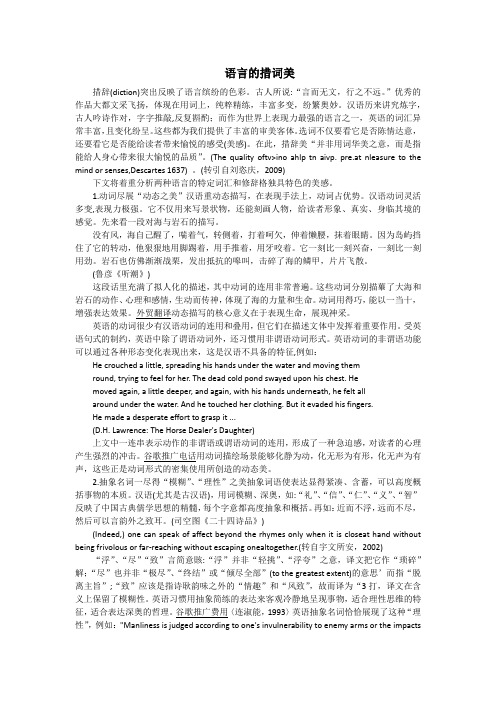
语言的措词美措辞(diction)突出反映了语言缤纷的色彩。
古人所说:“言而无文,行之不远。
”优秀的作品大都文采飞扬,体现在用词上,纯粹精练,丰富多变,纷繁奥妙。
汉语历来讲究炼字,古人吟诗作对,字字推敲,反复斟酌;而作为世界上表现力最强的语言之一,英语的词汇异常丰富,且变化纷呈。
这些都为我们提供了丰富的审美客体。
选词不仅要看它是否陈情达意,还要看它是否能给读者带来愉悦的感受(美感)。
在此,措辞美“并非用词华美之意,而是指能给人身心带来很大愉悦的品质”。
(The quality oftv>ino ahlp tn aivp. pre.at nleasure to the mind or senses,Descartes 1637) 。
(转引自刘恣庆,2009)下文将着重分析两种语言的特定词汇和修辞格独具特色的美感。
1.动词尽展“动态之美”汉语重动态描写,在表现手法上,动词占优势。
汉语动词灵活多变,表现力极强。
它不仅用来写景状物,还能刻画人物,给读者形象、真实、身临其境的感觉。
先来看一段对海与岩石的描写。
没有风,海自己醒了,喘着气,转侧着,打着呵欠,伸着懒腰,抹着眼睛。
因为岛屿挡住了它的转动,他狠狠地用脚踢着,用手推着,用牙咬着。
它一刻比一刻兴奋,一刻比一刻用劲。
岩石也仿佛渐渐战栗,发出抵抗的嗥叫,击碎了海的鳞甲,片片飞散。
(鲁彦《听潮》)这段话里充满了拟人化的描述,其中动词的连用非常普遍。
这些动词分别描蓽了大海和岩石的动作、心理和感情,生动而传神,体现了海的力量和生命。
动词用得巧,能以一当十,增强表达效果。
外贸翻译动态描写的核心意义在于表现生命,展现神采。
英语的动词很少有汉语动词的连用和叠用,但它们在描述文体中发挥着重要作用。
受英语句式的制约,英语中除了谓语动词外,还习惯用非谓语动词形式。
英语动词的非谓语功能可以通过各种形态变化表现出来,这是汉语不具备的特征,例如:He crouched a little, spreading his hands under the water and moving themround, trying to feel for her. The dead cold pond swayed upon his chest. Hemoved again, a little deeper, and again, with his hands underneath, he felt allaround under the water. And he touched her clothing. But it evaded his fingers.He made a desperate effort to grasp it ...(D.H. Lawrence: The Horse Dealer's Daughter)上文中一连串表示动作的非谓语或谓语动词的连用,形成了一种急迫感,对读者的心理产生强烈的冲击。
英译汉教程3_翻译中措辞的选择
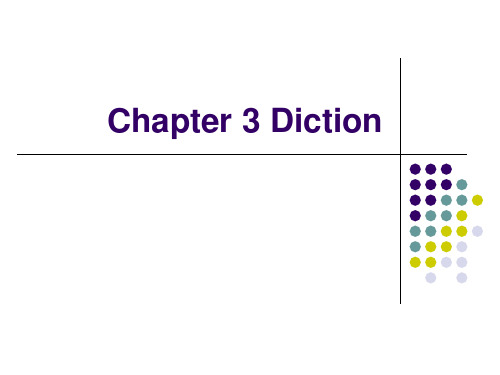
Choice of collocative meaning
Some words have the same basic meaning, but differ in collocation. (搭配) eg. mother tongue (acceptable) mother language (unacceptable) a man of sense (acceptable) a man of meaning (unacceptable)
Assignments
Comparison of translated sentences. (P77) Comparison of translated texts. (P85) Translate the sentences. (P84)
Choice of exact meaning
To weigh the meaning before choosing a suitable word for translation (斟酌、权衡词 义) Do not lap up a word or an expression without digesting it (勿囫囵吞枣) Do not extend the meaning beyond its limits (勿引申过度) Do not rigidly adhere to letter or form(勿拘 泥字面
燥乏味。
Translate the following sentences.
1. On display was merchandise attractive in quality and price. 2. They captured fifty enemy soldiers and many weapons. 3. In order to get a large amount of waterpower, we need a large pressure and a large current.
【最新】英语写作3
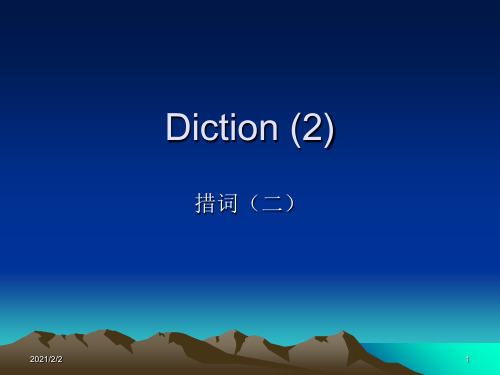
2021/2/2
11
4. Metonymy (换喻)
• 用某一事物的名称代替另外一个与它关系密切 的事物的名称的手法叫换喻。
• 只要一提到其中一种事物,就会使人联想到另一 种。
• 比如用the White House 代替美国政府或者总 统, 用the bottle来代替wine 或者alcohol, 用 the bar 来代替the legal profession,用 crown代 替 king等。例如:
2021/2/2
13
5. synecdoche(提喻)
• 以局部代表整体,或者用整体代替部分的手法叫 提喻。
• 以局部代表整体(如用手 代表 水手 ), • 以整体代表局部(如用 法律 代表 警官 ), • 以特殊代表一般(如用 直柄剃刀 代表 杀人者 ), • 以一般代表特殊(如用 贼 代表 扒手 ), • 或用原材料代表用该材料制造的东西(如用 钢 代
pearls before a swine . 3. 不仅仅名词才可以作隐喻,动词,形容词和副词都可以有
隐喻的用法。
如:The picture of those poor people’s lives was carved so sharply in his heart that he could never forget it.
2021/2/2
19
8. Overstatement (Hyperbole)/understatement 夸大(夸张)/缩小
• 夸大:把事情说的过分 • 缩小:把分量或程度压低 • 目的:使陈述或描述鲜明和有趣 • 如:
沟通技巧:措辞的应用

05
非你不可
听到“只有你是特别的”, 人就很容易被说动。 利用“非你不可”,能让 对方感到自己被选中的优 越感,从而乐于做出回应。
06
团队化
如果我们发觉对方“怕麻烦” 或者“没找到做这件事的必 要性”,使用团队化技巧相 当有效。 利用“团队化”,能使对方 产生伙伴的意识,即使是麻 烦的请求,也会乐于接受。 。
沟通技巧
把NO变成YES:措辞的运用
别把决定权交 给对方的心情
面对一些重大的请求,别把 决定权交给对方的心情,而是通 过我们自己的请求方式来提高对 方回答“Yes”的概率!
“三步走”
01 st
02 nd
03 th
考虑符合对方利益的措辞 揣摩对方的心理
不直接说出自己的想法
01
投其所好
最基本,也是最有效的 利用“投其所好”,既 获得对方好感,又能实 现自己的期望
02
儆其所恶
对难以说服的人有效。 利用“儆其所恶”,能 形成强大的强制力。
03
儆其所恶
关键在于给出两个合适的 选项,无论对方选择哪个, 都能达到自己的目的。 利用“选择的自由”,能 够引导对方,同时又不会 留下被迫感。
04
被认可欲
对于生意和家人,有着较 高的适应度。 利用“被认可欲”,对方 即使很难对付,也会乐于 回应期待。
07
感谢
仅凭一句“谢谢”,就能 拉近与对方的距离,使对 方难以拒绝。 能让对方隐约产生信赖的 意识,从而难以轻易拒绝。
请求不单单是己方的 语言,而应该是双方 共同的事情!
THANK
YOU
谢
谢
观
看
翻译措辞
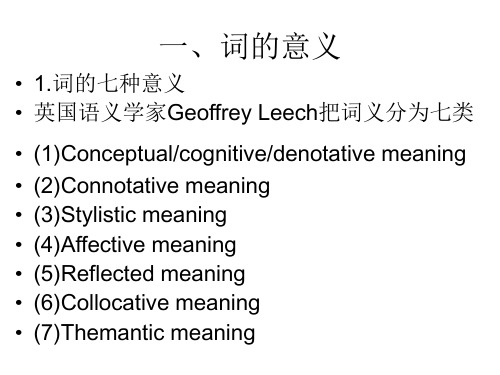
5。 She took to her studies eagerly, and proved an adapt pupil.(个别—一般)
(三)注意词的褒义和贬义 1. They incited him to go into further investigation . 2.The plotters incited the soldiers to rise against the
government. 3. The enemy’s scheme went bankrupt; 4. We have mapped out a scheme. . 5 They enjoyed every bit of the Communist’s
一、词的意义
• 1.词的七种意义 • 英国语义学家Geoffrey Leech把词义分为七类
• (1)Conceptual/cognitive/denotative meaning • (2)Connotative meaning • (3)Stylistic meaning • (4)Affective meaning • (5)Reflected meaning • (6)Collocative meaning • (7)Themantic meaning
but not to have you make a dash in the world-marry rich men merely because they are rich, or have splendid houses, which are not homes because love is wanting..
英语修辞diction
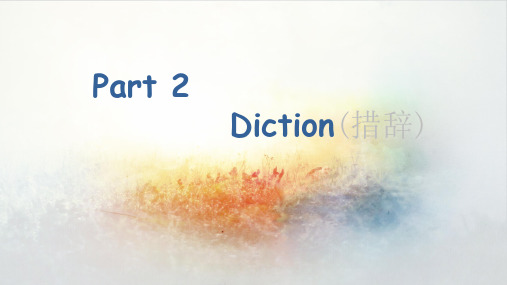
Diction(措辞)
Insert Text Here
59 4 3 1 2 0 1 2 3 4 5 6 7 8 00 00 10
Hours Minute
• • • • • • Ⅰ. Ⅱ. Ⅲ. Ⅳ. Ⅴ. Ⅵ. Levels of Words The Meaning of Words General and Specific Words Idioms Figures of Speech Dictionaries
Definition:Words which are mainly used in informal or
familiar conversation.
Usage: In literary works their main use is to record people's
thoughts and dialogues. Feature: They are usually short words of one or two syllables and most of them are of Saxon origin (起源于撒克 逊人)— not borrowed from Greek, Latin, or French).
General and Specific Words
General and Specific Words:
General Words are recapitulative. Specific Words are detailed--it helps to make writing clear, exact, vivid, and striking, for they are more informative and expressive than general words.
汉译英翻译技巧
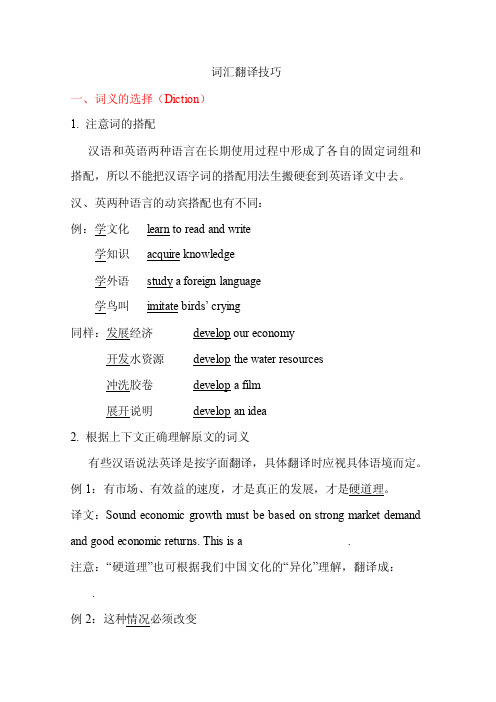
词汇翻译技巧一、词义的选择(Diction)1. 注意词的搭配汉语和英语两种语言在长期使用过程中形成了各自的固定词组和搭配,所以不能把汉语字词的搭配用法生搬硬套到英语译文中去。
汉、英两种语言的动宾搭配也有不同:例:学文化learn to read and write学知识acquire knowledge学外语study a foreign language学鸟叫imitate birds’ crying同样:发展经济develop our economy开发水资源develop the water resources冲洗胶卷develop a film展开说明develop an idea2. 根据上下文正确理解原文的词义有些汉语说法英译是按字面翻译,具体翻译时应视具体语境而定。
例1:有市场、有效益的速度,才是真正的发展,才是硬道理。
译文:Sound economic growth must be based on strong market demand and good economic returns. This is a .注意:“硬道理”也可根据我们中国文化的“异化”理解,翻译成:.例2:这种情况必须改变译文:This must change.分析:此处要正确理解原文的词义。
汉语措辞中的“情况”一词的基本意义与英语中的circumstance, situation, condition等词相近,但是究竟怎样翻译,还需要根据上下文来决定。
二、词的增补(Amplification)词的增补又常叫增译/增词法,是为使译文准确、通顺、达意。
增译有语义性增译修辞性增译,还有注释性增译(文内阐释或文中夹注)1.增补主语汉语中无主语的句子很多,汉译英时要根据上下文的意思选择适当的代词或名词补做主语。
增加什么主语取决于上下文。
例1:知己知彼,百战不殆译:2. 增补非人称的或强调句中的itit可以指天气、时间,还常用来表示强调、代替不定式等。
翻译技巧1-diction培训讲学

Delicate difference
讲不大清楚的差别
Delicate surgical operation 难做的外科手术
……
3) Distinguish the original meaning of an
English word by means of syntax(从词的语 法形式判断)
7. 王教授精通小学和《大学》
8. 毛泽东同志的思想和学说是永存的;
关于社会注意建设总路线的基本思想;
破除迷信,解放思想;
毛泽东军事思想的一个重要组成部分,是关于人民 战争的思想;
政治问题和思想问题。
1. 广播学校(通过电台对各地的学生授课的学校) 误:空军学校 2. 昨晚我去参加了我们中国研究组的集会。 (do: n. social function 集会,娱乐宴聚活动)误:
machine, engine, plane, aircraft...机 sheep, goat, ram, ewe, lamb...羊
4) Equivalents Interwoven with One Another
Say
说
Speak
讲
Talk
谈
Tell
诉
这可说不得。 我代他向你说
Warming-up exercises:
1. The School of the Air (the school of the air)
2. Last evening I went to a do held by our China Study Group.
3. The see of Sydney
1) Distinguish the original meaning of an English word by means of context
翻译技巧4 措词、具体化、词类转换
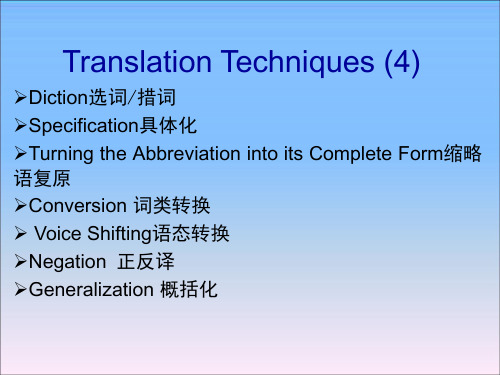
例1苏格兰之旅 (textbook P 74)
• (1) There is something which comes free with every Scottish break — a new perspective. (2) Scotland appeals to all kinds of people. (3) It draws those who can feel the past in ancient stone. (4) It soothes with its soft winds and austere beauty all who must escape the everyday. (5) It lures the walker and climber, captivates the golfer and angler, and charms all who appreciate quality in art and culture, heritage, or food. (6) Above all, because it is relaxing and rewarding, it allows you to re-discover yourself. (7) And the memory of that will stay with you forever.
文房四宝 (textbook P12)
• (1)宣纸是安徽泾县的著名特产。由于历来在附近的宣城集散,因而得名。 (2)宣纸的特色是白如雪,柔如棉,拉力大,润墨性强,最宜题诗作 画,且不蛀不腐,深得我国不少画画名家的推崇。 (3)所以,宣纸一直 享有“纸寿千年”的美誉,居文房四宝之首。
Diction (遣词用字)
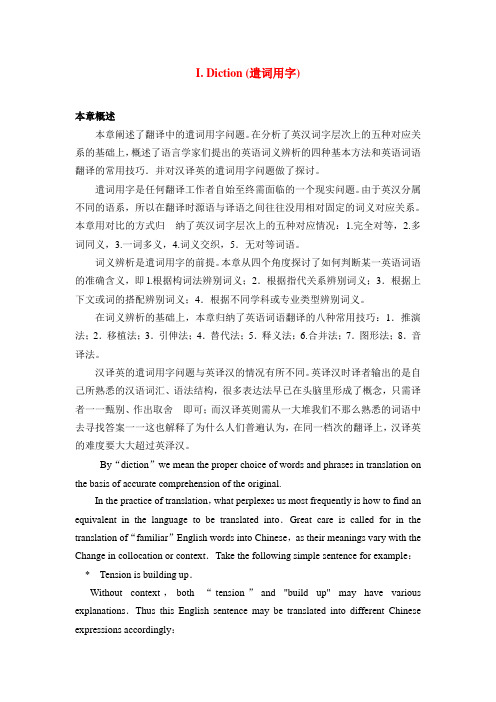
I. Diction (遣词用字)本章概述本章阐述了翻译中的遣词用字问题。
在分析了英汉词字层次上的五种对应关系的基础上,概述了语言学家们提出的英语词义辨析的四种基本方法和英语词语翻译的常用技巧.并对汉译英的遣词用字问题做了探讨。
遣词用字是任何翻译工作者自始至终需面临的一个现实问题。
由于英汉分属不同的语系,所以在翻译时源语与译语之间往往没用相对固定的词义对应关系。
本章用对比的方式归纳了英汉词字层次上的五种对应情况:1.完全对等,2.多词同义,3.一词多义,4.词义交织,5.无对等词语。
词义辨析是遣词用字的前提。
本章从四个角度探讨了如何判断某一英语词语的准确含义,即l.根据构词法辨别词义;2.根据指代关系辨别词义;3.根据上下文或词的搭配辨别词义;4.根据不同学科或专业类型辨别词义。
在词义辨析的基础上,本章归纳了英语词语翻译的八种常用技巧:1.推演法;2.移植法;3.引伸法;4.替代法;5.释义法;6.合并法;7.图形法;8.音译法。
汉译英的遣词用字问题与英译汉的情况有所不同。
英译汉时译者输出的是自己所熟悉的汉语词汇、语法结构,很多表达法早已在头脑里形成了概念,只需译者一一甄别、作出取舍即可;而汉译英则需从一大堆我们不那么熟悉的词语中去寻找答案一一这也解释了为什么人们普遍认为,在同一档次的翻译上,汉译英的难度要大大超过英泽汉。
By“diction”we mean the proper choice of words and phrases in translation on the basis of accurate comprehension of the original.In the practice of translation,what perplexes us most frequently is how to find an equivalent in the language to be translated into.Great care is called for in the translation of“familiar”English words into Chinese,as their meanings vary with the Change in collocation or context.Take the following simple sentence for example:* Tension is building up.Without context,both “tension”and "build up" may have various explanations.Thus this English sentence may be translated into different Chinese expressions accordingly:·形势紧张起来。
专四写作措辞与语句Dictionandsentence
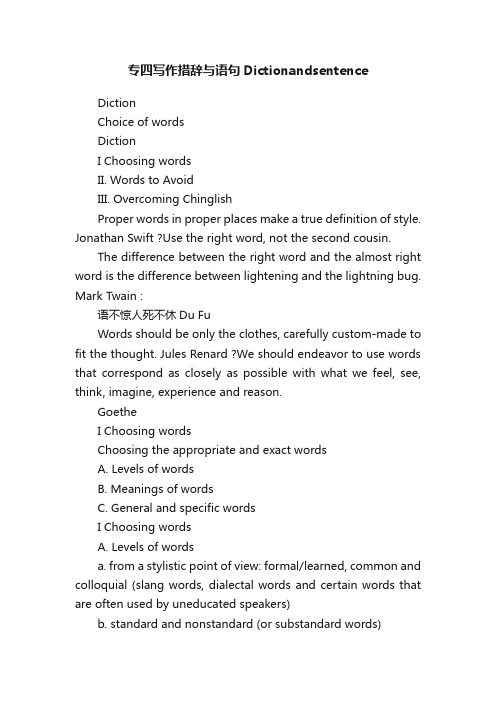
专四写作措辞与语句DictionandsentenceDictionChoice of wordsDictionI Choosing wordsII. Words to AvoidIII. Overcoming ChinglishProper words in proper places make a true definition of style. Jonathan Swift ?Use the right word, not the second cousin.The difference between the right word and the almost right word is the difference between lightening and the lightning bug. Mark Twain :语不惊人死不休Du FuWords should be only the clothes, carefully custom-made to fit the thought. Jules Renard ?We should endeavor to use words that correspond as closely as possible with what we feel, see, think, imagine, experience and reason.GoetheI Choosing wordsChoosing the appropriate and exact wordsA. Levels of wordsB. Meanings of wordsC. General and specific wordsI Choosing wordsA. Levels of wordsa. from a stylistic point of view: formal/learned, common and colloquial (slang words, dialectal words and certain words that are often used by uneducated speakers)b. standard and nonstandard (or substandard words)B. Meanings of wordsa. denotation/literal meaning本义the direct, explicit meaning or reference of a word or a term (Webster’s New Word Dictionary)b. connotation/associative meaning转义Idea or notion suggested by or associated with a word, phrase, etc. in addition to its explicit meaning, or denotationI Choosing wordsCompare:Tom is ambitious/ tough-minded/ foresighted/ firm/ self-respecting/ persistent.Tom is pushy/ ruthless/ calculating/stubborn/egotistical/ nagging.country, nation, state, landask, question, interrogatetime, age, epochlarge, bigthrifty, frugal, stingymodest, humbleslender, slim, emaciatedThese words can be called synonyms but may be different in stylistic level, in the degree ofemphasis, in emotional coloring, in tone and in collocation.Mind:Very often an English word has no exact Chinese equivalent and it has to be translated in different ways in different contexts.Choices1. A few listeners were uninterested/ disinterested and dozed off.2. Though she has grown up, her behavior is oftenchildlike/childish.3. Her clothes, though made of cheap/inexpensive material, are quite elegant.4. Is that old/elderly woman/lady sitting by the window your mother?5. I am sorry to refuse/decline your kind invitation.6. This homely/ugly old man is a well-known composer.7. This servile man was especially humble /modest when he was talking with his superiors.8. My father became stout/fat as he grew older.9. I can never forget the little/small town where I spent my happy childhood.10. The modernization programme has won the support of the whole nation/country.C. General and specific wordsProfessionals-----scientists, doctors, teachers lawyers, journalistsscientists-----physicists, chemistschemists---biochemists ?Compare:Fido is the most lovable creature I know.Fido is the first animal I ever liked.Fido is one of our three dog s.Fido is the fastest hound I have ever seen.We have three hounds: a dachshund(德国种小猎狗) named Willy, a gray hound named Mick, and a basset(短腿猎犬) named Fido.由一般(general)趋于特定(specific)Specific words are much more concrete and colorful than the general ones; they seem to make the reader see, hear, smell, touch or feel what the writer wished to describe. They help tomake writing clear, exact, vivid and striking, for they are more informative and expressive than general words. General words convey a kind of emotion (love), condition (misery), thought (democracy), theory (evolution), science (biology) or a group of things (creature, plant, organism).Too many specific words may result in difficulty in grasping the main idea while too many general words may cause the writing to be dull and difficult.由一般(general)趋于特定(specific)Abstract and general words are indispensable, and the accomplished writer can take advantage of both, can move back and forth between the language of ideas and the language of hard realities.由一般(general)趋于特定(specific)1. a. She loves flowers.b. She loves roses and chrysanthemums.2. a. A few houses were destroyed yesterday.b. Five houses were burnt down yesterday.3. a. If a person is reading his love letter, you must not lean over his shoulder to read it.b. If a person is reading his love letter, you must not lean over his shoulder to share it.4. a. It grew dark before seven o’clock. The wind was strong and the rain was heavy.b. It grew dark before seven o’clock. Wind and rain whipped the house.5. a. An elderly man had collapsed while crossing the street, and an ambulance took him to a hospital. ? b. An elderly man had collapsed while crossing the street, and an ambulance rushed him to a hospital.6. a. Trees surround the water near our summer place.b. Old elms surround the lake near our summer cabin.See if you can create clearer pictures from these sentencesA car was parked in the street.Some children stood anxiously at the counter.Our friends have a place at the shore.The table was cluttered with his things.A man was standing at the corner.She bore a great burden.A shiny red Mercury convertible was parked against the curb near a hydrant.Four little urchins in ragged blue jeans stood with their smudgy faces pressed against the candy counter.The Rothblums have a two-bedroom bungalow a block from the ocean in Brandt Beach, New Jersey. ?Jeff’s notebook, books, and baseball glove cluttered the diningroom table.A tall, lanky farmer in faded overalls and a battered straw hat was leaning against the mailbox on the corner of Main Street and First Avenue.After her mother died, Sylvia helped raise her younger brothere and cared for her ill father.Compare:1) We experienced difficulty in that situation.2) The cartilage in my ankle ripped painfully as I slammed onto the icy sidewalk. As I lay on my back, cursing myself for jogging in subzero weather, the chill of the morning wind made me shiver. I tried to raise my body but my ankle would not move, and all I could do was fall back on my concrete bed. I felt nothing, but pain, cold and dismay.Provide specific words for the following general words:brightly-colored red, scarletSlowly two miles an hourRun sprint, dash, gallop, race, dart, trot,scurry, scamper, lopeWalk amble saunter trudge drag strolltiptoe clump slouch prance tramptotter trot wade waddle shuffleswag swagger mince stride strutstagger hobble limp plod stumbletoddle loiter lurch sneak padProvide specific words for the following general words: A good man Good foodHouseLaughBeverageSeeSayWalkSkilfulHitWeaponBigSmallBraveProvide specific words for the following general words: AfraidComplainPleasedTrueStubbornFlexibleThinFatNoiseSilenceBeautifulUglyActiveInactive由模糊(vague)趋于明确(definite)1.a. It was a dreadful journey.b. It was a tiring, tedious and dangerous journey.2. a. Although the commander had an awful temper and a terrible voice, he showed wonderful care for his men.b. Although the commander had a fiery temper and a gravely voice, he showed fatherly care for his men.由模糊(vague)趋于明确(definite)Lazy adverbs (懒散副词)Absolutely, awfully, dreadfully, terribly, terrifically, frightfully, horribly, desperately, fiercely, badly, hugely, simply, wildly, jolly, right, pretty, precisely, mighty, marvelously, tremendously, wonderf ully…CompareThe beggar was awfully thin. /The beggar was pitifully thin.My new teacher is absolutely handsome. /My new teacher is strikingly handsome.My supervisor’s tone is very critical. /My supervisor’s tone is sharply critical.It is terribly hot today. / It is burning hot today.We had a wildly cold night. / We had a freezing night.由抽象(abstract)趋于具体(concrete)1. a. Mr Bunney looked at the vegetables before him.b. Mr Bunney gazed dismally at the vegetables before him.2. a. The man was standing under a tree.b. Jim Jones, our village postman, was walking under a large oak-tree.3. a. The cable consists of many wires.b. The cable consists of 100 strands of very fine copper wires.4. a. He had a misfortune while swimming.b. A shell fragment ripped open his right arm while he was swimming.5. a. Tom is a lazy boy.b. Tom usually sleeps late in the morning and does little work after he gets up.由抽象(abstract)趋于具体(concrete)LookShe spotted him immediately among the people in the railway station, because he was wearing his yellow hat.The men in the boated sighted land.They were observed entering the bank at 8:30.Several possible buyers are coming to view the house.He scanned the pages of the book to what it was about.He witnessed the accident himself; he saw it all.She glanced down the list of names.Stop eyeing me like that.She peered through the mist, trying to find the right path.He gaped at her in surprise.D. Using idiomsAn idiom is a fixed group of words with a special meaning which is different from the meaning s of the words that form it.Common types of idioms:Phrasal verbs put up with, look forward to, carry onN.+ prep. + n. a straw in the wind, the apple of one’s eye, like a fish out of waterPrep. +n. on the air, at length, at large, in person, with flying colorsV. +n. slip one’s mind, go to the dogs, stew in one’s own juice, teach an ol d dog new tricks, teach one’s grandmother to suck eggsAs…as as big as life, as poor as church mouse, as mute as a fish, light as a feather ?Pairs of words in black and white, sink or swim, high and dry, touch and goSayings Don’t count y our chickens before they are hatched.A stitch in time saves nine. One man’s meat is another man’s poison. Tastes differ. Each dog will have his own day.Idioms in sentencesThe first American presidential dark horse was James Polk.You can’t tell how she feels, she doesn’t wear her heart on her sleeve.John could not go to a library, and writing the report was a job of making bricks without straw.?The quickly-called meeting of the President and his cabinet was a straw in the wind.Although it is a small nation, it is a formidable opponent, for it is armed to the teeth.John said he was more interested in the competition itself than in the prize. Obviously it was sour grapes to him.Don’t waste time here, talk turkey please or I’ll go.Profit is generally the apple of discord among capitalist nations.Mum said I’d better leave the kitchen because she did notneed my help and I was like a bull in a china shop there.Although Jack is thought to be the contestant most likely to win the gold medal, David and Harry are among the dark horses.Idioms in sentencesThough Henry Adams found Cambridge a ―social desert‖, it flowed with intellectual milk and honey.?He would not have met his Waterloo if his courage hadn’t failed him.It rained cats and dogs yesterday evening.He was threatened with a beating by a fellow who was an ass in a lion’s skin.He blows hot and cold about making friends, so he has few close friends.I believe t his will prove to be a Pandora’s box in the long run.Ever since he entered this school, he has always been the apple of the teacher’s eye.How many times do I have to tell you not to leave you homework till the eleventh hour??Judging from the way he spends money, he was born with a silver spoon in his mouth.Idioms in sentencesWhen the police began to investigate, five of the man left the country, leaving the sixth holding the bag.Jack seems to be wasting away. He is nothing but a bag of bones.If you break a window, do not pass the buck; admit that you did it.Your life in this town has been an open book,--perhaps too open.Bob’s unexpected visit played the devil with our own plans to travel.To give the devil his due, old Simpkins, miser though he is, has always been generous to Joy.He has then completely under his thumb. They don’t dare t o defy them.When she is around, he is nervous and seems to be all thumbs.Don’t talk about vanity in my brother’s hearing; it is his Achilles heel.Having already heard that Helen is an avid mountain climber, I broke ice by talking about our favorite sport.Mind:Most idioms are informal or colloquial in style and can be used in conversation; but a few are slang and should be used with care. Many idioms have become clichés and are no longer fresh or interesting and should be used sparingly.II. Words to AvoidA. Jargon(1) When I asked my parents if I could use the car, the feedback was negative.(2)Upwardly mobile young lawyers often work 70 hours a week.If you do have to write professional articles for common readers, you cana) use a certain number of technical terms with interpretation or definitionb) refer to the following passage:If we become free of disease, we would make a much better run of it for the last decade or so, but might still terminate on about the same schedule as now. We may be like the genetically different lines of mice…programmed to die after predeterminednumber of days clocked by their genomes. If this is the way it is, some of us will continue to wear out and come unhinged in the sixth decade, and some much later, depending on genetic timetables.Words to AvoidB. Big words / Pretentious wordsGobbledygook –pompous, official-sounding language which use twenty words to express a three-word thought.GobbledygookUndesirable waste material is removed on a semiweekly basis by municipal employees specially assigned to such activity.Personnel are requested to extinguish illumination before departure from these premises.The causal factor of her poverty becomes obvious when one considers the number of offspring she possesses.It is my fervent wish that the creator of the universe will do his utmost to preserve and protect the royal lady who graciously occupies the position of the head of state.ImprovedCity collectors pick up garbage twice a week.Please turn out the lights before leaving.She is poor because she has too many children.God save the queen.Words to AvoidExercise(1) Were it not for the lucrative financial rewards, she should have tendered her resignation.(2) Large-size passenger vehicles utilize excessive quantities of fuel.(3) Years of research have impacted positively on ourunderstanding of cancer.(4) The very thought of flying made her paranoid.Notice how the simple vocabulary in the following examples express the ideas more clearly and precisely than do the ―big words‖Words to AvoidC. Clichéstrite expressionsexpressions that have been used so often that they are no longer effectiveClichésNotice how much more effective the following simple, straightforward expressions are than the clichés.A list of the most common clichésApple of one’s eyeBaker’s dozenFace the musicFew and far betweenGet up on the wrong side of bedHit the nail on the headIn the same boatNip in the budNo love lostOne foot in the graveA list of the most common clichésRadiantly happyRain or shineRaining cats and dogsSnake in the grassTempest in the teapotTwinkling of an eyeSupreme sacrificeThe man in the streetSell like hot cakesOut of the woodsIn the final analysisAll in allAs a matter of factNoticeIt is not necessary to memorize all clichés or eliminate them entirely from your prose. Both tasks would be impossible. The clichés to watch out are the ones that recur in your w ork as all-purpose filler.Words to AvoidD. SlangRefers to a kind of colloquialism, characterized byA> eccentric humorB> forced, fantastic or grotesque meaningsC> noveltyD>attempts to be colorful, fresh and vividSome examples of slang ISome examples of slang IINoticeSome slang words or expressions may, through wide circulation, become acceptable in standard English, such as mob, highbrow, cop. Much slang, however, goes out of fashion very quickly through overuse and may be entirely forgotten in a very short time.In short, it is inappropriate in serious and formal writing because it is too vague and makes the writer sound offensive andfunny.ExamplesOn hearing that his father had kicked the bucket, we wrote him a letter to express our sympathy. ?The big banquet held in honor of the distinguished guests was really neat.III. Overcoming Chinglish中式英语Chinglish (that misshapen, hybrid language that is neither English nor Chinese but that might be described as ― English with Chinese Characteristics‖.--------Joan PinkhamIII. Overcoming ChinglishSome examples of the wrong use of wordsThey stood on top of the hill, attracted by the beauty of the garden city.They had no basis of feeling.他占有欲与生俱来。
- 1、下载文档前请自行甄别文档内容的完整性,平台不提供额外的编辑、内容补充、找答案等附加服务。
- 2、"仅部分预览"的文档,不可在线预览部分如存在完整性等问题,可反馈申请退款(可完整预览的文档不适用该条件!)。
- 3、如文档侵犯您的权益,请联系客服反馈,我们会尽快为您处理(人工客服工作时间:9:00-18:30)。
Importance of diction
• Good English means "proper words in proper places."
• 1). Upon my first colleges class, I seated myself at the rear of the huge lecture hall and attempted to avoid being observed. However, a skinny girl who occupied the seat immediately in front of mine twisted around and grinned. She proceeded to engage me in a whispering conversation numerous times during the hour. I made a decision to change my location.
Common words
Colloquial Words
• You have your tension. Sometimes you come close to having an accident, that upsets you. You just escape maybe by a hair or so. Sometimes maybe you get a disgruntled passenger on there, and starts a big argument. Traffic. You have someone who cuts you off or stops in front of the bus. There’s a lot of tension behind that. You got to watch all the time. You’re watching the drivers, you’re watching other cars. Most of the time you have to drive for the other drivers, to avoid hitting them. So you take the tension home with you.
1.Stylistic color of words(词 词 的语体色彩) 的语体色彩)
• three types: • formal • common • colloquial
Formal words
• There is nothing new in the recognition, within a given language, of a distinction between common usuage and uses of the language for more restricted purposes and often enough, perhaps characteristically, more elevated purposes. The monolithic (单 单 一的;统一的) 一的;统一的 nature of English is not questioned when literary essayists like Emerson contrast peotry and common speech. The latter is recognized in America to be the proper subject for the investigation of linguists who, however, now show some incipient (起初的 inclination to investigate 起初的) 起初的 poetry, too, and other noncasual (无关联的 无关联的) 无关联的 话语)iin a given language. utterances (话语 话语
Thank You !
3.3 Dynamic words vs Static Words
• 1) I am hungry. vs My stomach clamours for food. (2) There are two important points in his speech. vs His speech embraces two important points.
2.The Meaning of Words
• conceptual meaning (本义) • associative meaning(引申义).
例如: woman-female adult human being man- male adult human being woman-being frail,being prone to tears or being gentle. • man- strong mentally or physically • • • •
3.2 Concrect words vs Abstract words
• Concrete words-rose、chair 、 • Abstract words -democracy”, “politics”, “culture”, “spirit” • 举例 (1) Man is rapidly destroying the Earth. (2) “What’s the smell?”I asked the man beside me in the bus.
3.Semantic Types of Words • specific vs general • concrete vs abstract • dynamic vs static
3.1 General words vs Special words
• Professionals--scientists, doctors, teachers, lawyers, journalists • a good man--kind, honest, just, generous, sympathetic, warm-hearted, selfless, honorable • good food--tasty, delicious, nourishing, rich, wholesome, fresh, appetizing, abundant • Laugh--smile, grin, beam, giggle, titter, snigger, chuckle, guffaw, chortle
comparison
• 2). When I went to my first college class, I sat in the back of the big room and tried not to be seen. But a slender girl sitting just in front of me turned and smiled. She spoke softly with me several times and smiled. She spoke softly with me several times during the hour. I decided to change my seat.
4 Emotional Types of Words
• appreciative words • derogatory words
• “Proper words in proper place make the true definition of style.” 合适的词用在合适的地方就是好文 章。 ——Jonathan
• When I was a kid, and reading every science fiction book in the local library, I used to wonder exactly how the future would happen. By that I don’t mean what the future would be like —— science fiction already told me that —— but rather how we’d actually get there. Science fiction books seemed to agree, for example, that in the future there would be no money —— all transactions would be made via identity cards and centralized computers. But that seemed dubious to me: how, I wondered, are you going to get everybody to give up money in the first place?
English writing
Dictionபைடு நூலகம்
What?
• diction
• the choice and use of words in writing or speech
Why?
• The difference between the right word and the almost-right word is as great as that between lightning and the lightning bug. “用词准确与用词几乎准确,这两者之间 用词准确与用词几乎准确, 用词准确与用词几乎准确 的差异就如闪电与萤火虫之间的差异。 的差异就如闪电与萤火虫之间的差异。” • ----- Mark Twain •
